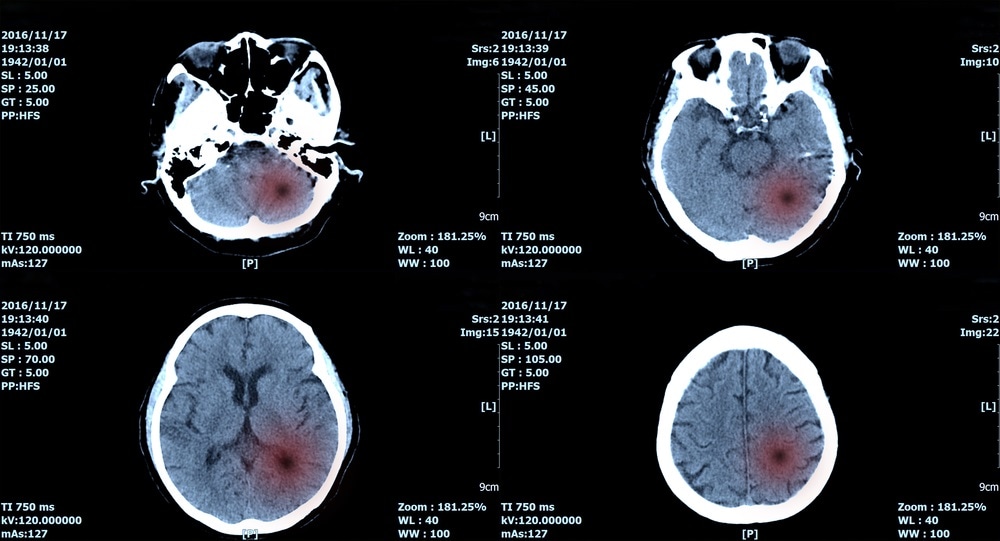A brain tumor is a mass of abnormal cells that grow in the brain. In 2016 alone, there were 330,000 incident cases of brain cancer and 227,000 related-deaths worldwide. Early detection is crucial to improve patient prognosis, and thanks to a team of researchers, they developed a new imaging technique and artificial intelligence algorithm that can help doctors accurately identify brain tumors.
 Image Credit: create jobs 51 / Shutterstock.com
Image Credit: create jobs 51 / Shutterstock.com
Published in the journal Nature Medicine, the study reveals a new method that combines modern optical imaging and an artificial intelligence algorithm. The researchers at New York University studied the accuracy of machine learning in producing precise and real-time intraoperative diagnosis of brain tumors.
In the past, the only way to diagnose brain tumors is through hematoxylin and eosin staining of processed tissue in time. Plus, interpretation of the findings relies on pathologists who examine the specimen. The researchers hope the new method will provide a better and more accurate diagnosis, which can help initiate effective treatments right away.
In cancer treatment, the earlier cancer has been diagnosed, the earlier the oncologists can start the treatment. In most cases, early detection improves health outcomes. The researchers have found that their novel method of detection yielded a 94.6 percent accuracy, compared to 93.9 percent for pathology-based interpretation.
The imaging technique
The researchers used a new imaging technique called stimulated Raman histology (SRH), which can reveal tumor infiltration in human tissue. The technique collects scattered laser light and emphasizes features that are not usually seen in many body tissue images.
With the new images, the scientists processed and studied using an artificial intelligence algorithm. Within just two minutes and thirty seconds, the researchers came up with a brain tumor diagnosis. The fast detection of brain cancer can help not only in diagnosing the disease early but also in implementing a fast and effective treatment plan. With cancer caught early, treatments may be more effective in killing cancer cells.
The team also utilized the same technology to accurately identify and remove undetectable tumors that cannot be detected by conventional methods.
"As surgeons, we're limited to acting on what we can see; this technology allows us to see what would otherwise be invisible, to improve speed and accuracy in the OR, and reduce the risk of misdiagnosis. With this imaging technology, cancer operations are safer and more effective than ever before," Dr. Daniel A. Orringer, associate professor of Neurosurgery at NYU Grossman School of Medicine, said.
Study results
The study is a walkthrough of various ideas and efforts by the research team. First off, they built the artificial intelligence algorithm by training a deep convolutional neural network (CNN), containing more than 2.5 million samples from 415 patients. The method helped them group and classify tissue samples into 13 categories, representing the most common types of brain tumors, such as meningioma, metastatic tumors, malignant glioma, and lymphoma.
For validation, the researchers recruited 278 patients who are having brain tumor resection or epilepsy surgery at three university medical centers. The tumor samples from the brain were examined and biopsied. The researchers grouped the samples into two groups – control and experimental.
The team assigned the control group to be processed traditionally in a pathology laboratory. The process spans 20 to 30 minutes. On the other hand, the experimental group had been tested and studied intraoperatively, from getting images and processing the examination through CNN.
There were noted errors in both the experimental and control groups but were unique from each other. The new tool can help centers detect and diagnose brain tumors, particularly those without expert neuropathologists.
"SRH will revolutionize the field of neuropathology by improving decision-making during surgery and providing expert-level assessment in the hospitals where trained neuropathologists are not available," Dr. Matija Snuderl, associate professor in the Department of Pathology at NYU Grossman School of Medicine, explained.
Journal references:
Patel, A., Fisher, J, Nichols, E., et al. (2019). Global, regional, and national burden of brain and other CNS cancer, 1990–2016: a systematic analysis for the Global Burden of Disease Study 2016. The Lancet Neurology. https://www.thelancet.com/journals/laneur/article/PIIS1474-4422(18)30468-X/fulltext#%20
Hollon, T., Pandian, B, Orringer, D. (2019). Near real-time intraoperative brain tumor diagnosis using stimulated Raman histology and deep neural networks. Nature Medicine. https://www.nature.com/articles/s41591-019-0715-9